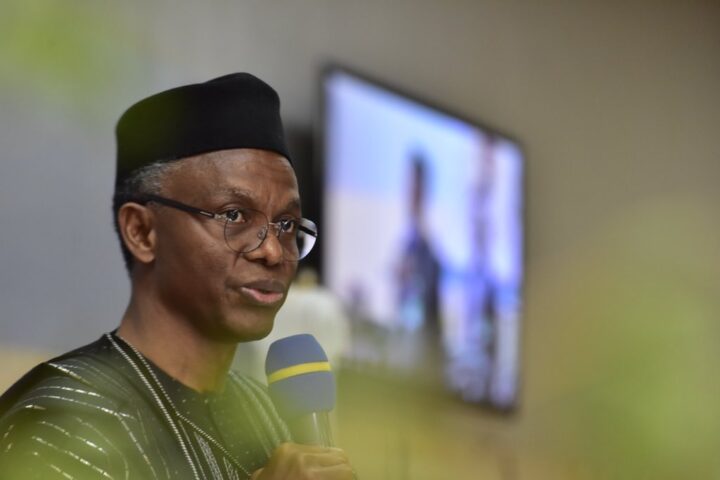SPOTLIGHT: Meet Michael Iloduba, Lagos-based entrepreneur who hawks bottled water in suits
Ali Mufuruki advised that African countries not confuse hype with reality, and hope, with achievement. That was when he spoke at the TEDxEuston event in 2014. He also described a Tanzanian story where a certain explorer named John Williamson happened on some locals playing a board game with diamonds, oblivious of the worth of the precious stones. Williamson bought the entire land around the area for cheap, built a modern house for the chief, gave out some trinkets and got the colonial government to ban any local from ever touching such stones even if they found it in the dirt. He became one of the world’s richest men on the back of the mines he founded. It may sound like some fable or urban legend, but similar scenarios played out in the colonial days, as African people were taken for everything we had. Ali was a Tanzanian billionaire himself. He died on the 9th of December, 2019 in South Africa after an illness.
It’s a good time to bring up this story as I continue to urge for Black African countries – especially Nigeria – to build capacity, build productivity, and take the long and sustainable route to development rather than the microwave approach that often attracts us. What the locals who didn’t know the value of the stones they played with needed, was not debt or ‘foreign investment’, or privatization or any of the esoteric solutions we chase today, but knowledge, and an ability to use and leverage upon the knowledge they acquire. I believe black African countries have not yet found the route to sustainable development.
My concern today is about the entrepreneurship hype. I recall, like 13 years ago, I was invited to a seminar by my Masters Degree Alma Mater – London Metropolitan University. One of the co-invitees headed the Entrepreneurship Centre of one famous Nigerian university. In promoting his wares, he reminded starry-eyed students and ex-students that a certain Nigerian businessman had diversified from providing cleaning services to being the largest supplier of armored cars. He made other such egregious claims and promote entrepreneurship as a means of merely acquiring money, that I writhed in my chair. Since then the entrepreneurship rhetoric has increasingly gained currency in Nigeria. We have even seen a number of major frauds who had claimed they were entrepreneurs. Anyone with inexplicable sources of income can hide under the moniker of ‘entrepreneur’ and get away with it – after all that is the realm in which one could make untold fortune. Some genuine entrepreneurs have also emerged but I believe the general approach masks some serious issues which we must of necessity deal with.
A recent report by The Economist magazine listed Nigeria as the country with the highest entrepreneurial activity on earth. Following Nigeria closely are Zambia, Senegal, Namibia, Ecuador, Uganda, Cameroon, Botswana, Burkina –Faso, and Angola. The magazine researched the percentage of our population aged between 18 and 64, who were owner-managers of new business between 2013 and 2018. Nigeria and Zambia had 39.9% of such people in entrepreneurship. Senegal had 38.6%, while Namibia, Ecuador, Uganda, Cameroon, Botswana, Burkina-Faso and Angola had 33.3%, 32.7%, 30.4%, 30.1%, 29%, 28.3% and 28.2% respectively.
Advertisement
Perhaps it is a good time to congratulate ourselves for a job well done for ensuring that the entrepreneurship drive took hold in Nigeria. But one of the obvious issues with the list is that almost all of them are from Africa (apart from Ecuador, which is not a shining economic example from South America). Unemployment rates have not reduced in Nigeria. Neither has standards of living improved. I have picked up research articles in an ongoing project, that concluded that this entrepreneurship drive is common to nations where the government is ineffective or absent and the economy has gone through, or is still going through dire straits. I have also come across the thoughts of people like Ory Okolloh Mwangi, who spoke about the ‘fetishization’ of entrepreneurship, especially in black African nations. Are we being channeled in the wrong direction? Are we thinking for ourselves at all? Or this is another of those policy directions we will come to regret in future, while the people who hijacked our thoughts will issue subtle apologies, as they have when we were cajoled into mass privatization, liberalization, structural adjustments, high interest rates, inflation-targeting and the rest.
Meanwhile in another report (see https://ceoworld.biz/2019/08/14/best-countries-for-entrepreneurship-for-2019/), by the CEOWorld Magazine, the USA was listed as the best country for entrepreneurship, or the most entrepreneurial country on earth. This time, the indices used include innovation, competitiveness, labour skills and infrastructure. The USA is followed by the United Kingdom, Israel, Poland, Malaysia, UAE, Sweden, India, Germany, Spain, France, Australia, and Estonia, in that order. In this other report, Nigeria was 58th. South Africa is the top country in Africa, at the 51st position, followed directly by Kenya at 52nd. Before we jubilate over The Economist’s report, which measures how many people are desperately struggling on their own, sometimes with capital that is so insignificant as to make impact on anyone, themselves inclusive, we need to consider what these two reports measure.
Nigeria is an interesting specimen, if we consider the fact that with a population of close to 200 million, the demographic of those between 18-64 is indeed large and could be estimated at probably between 100million and 120million. 40% of that would be 40 and 48million. This figures, because the SMEDAN (Small and Medium Scale Enterprises Development Agency of Nigeria) has it that we have about 40million of such companies, 99.5% of which are micro and small. With the new (commendable) government initiative in the Finance Bill, all of these companies will not be paying a dime in company income taxes, or VAT. With 40million able bodied men and women in entrepreneurship the question is; who are they selling to? Perhaps those boys in traffic who shove wares in the faces of commuters, may have also been considered as entrepreneurs, or small business owners.
Advertisement
There is a negative correlation between effective governance and this entrepreneurship drive. Like Ory Okolloh said in 2015, we cannot entrepreneur our ways out of bad or absent governance (bad schools or none at all, children on the streets in harsh weather as we have seen in parts of northern Nigeria lately, hopeless health centres, bad roads and collapsed infrastructure, or wrong-headed public policies which add more trouble to the society than solve problems). I strongly believe in that. We are giving up on the possibility of achieving good governance in Nigeria especially, as we have yielded space – out of nothing else but cowardice – to tribal warlords, out-and-out criminals, motor-park touts, 419 kingpins, to occupy government positions at all levels – executive, legislature and even the judiciary. The decay continues. An article in the same Economist magazine, published in October 2019, and tilted ‘Uberising Luck: Africa is full of Schemes to Help Entrepreneurs – They are hit and miss’, took a more critical view at the outcomes of the many schemes pushing everyone especially in black Africa into entrepreneurship. One interesting quote from the magazine goes;
“Decent jobs are so scarce in Africa that… many people create their own. Surveys by the Global Entrepreneurship Monitor find that one in three working-age adults in sub-Saharan Africa either runs a new business or is trying to start one, compared with one in six Americans and one in 20 Germans. In Tanzania informal firms created four-fifths of new non-farm jobs between 2002 and 2012. Most such enterprises are also tiny”.
I pray for a day that our youths and adults will go willingly into entrepreneurship because they want to not because they are pushed by circumstance, or conned into it by governments desperate to avoid responsibility for a growing population. As we have seen above, entrepreneurship works in the USA. UK, Germany and so on, because the conditions are right, the infrastructure is there and those going into entrepreneurship are adding real value to and making impact on the world in terms of the sophistication of their end products, not just living from hand to mouth. Many of those we call entrepreneurs in Nigeria are only one sickness, one misfortune or one downturn or bad business decision away from poverty. Their entire venture is not robust enough to actually provide for their needs. Many are in it just to get active – just to wake up and do something. Nigeria is wasting such people’s lives.
They are better off in public service, helping society at large, not chasing money around. And I will explain in a minute. Before I do, I want to point out that many of those businesses are not scalable. They never lift off the ground. They never get beyond me, myself, and I, so they do not create employment for anyone else apart from this pseudo-employment for the ‘solopreneur’. The challenges of technology into the future means that there will be more solopreneurs anyway. We are looking at a future where everyone will stand on their own, supported by technology. But entrepreneurs from places like Nigeria will hardly match those from these developed countries who target bigger things. A few of us will succeed actually, but the numbers will be infinitesimal. Those who don’t – in their many millions – will fall back to the dust in ignominious manner, in a country where no one gets your back.
Advertisement
The entrepreneurship phenomenon in Nigeria is explained by underlying theory, I must say. One theory of entrepreneurship holds that people go into entrepreneurship sometimes to just prove that they could be useful, or they could achieve. This is the Achievement Motivation Theory. Another theory says a traumatized people will usually go into entrepreneurship en masse e.g. after a war, or a genocide, or after their former status may have been forcefully removed. This is the Removal of Status Theory. This is what happened to the Jews, and the Igbos of Nigeria. We should however be concerned about entrepreneurship that can have global impact, not such as looks inward and tries to make a point at home.
Back to the Public Sector. We haven’t really built public sector opportunities in Nigeria. The jobs are there. Look at Social Work? We have almost nothing in that area. Most of those in public service in developed countries, work in this area. We see mentally challenged people raising their children on the streets here and nothing happens. Look at the children in the cold in their millions in the north of Nigeria today, or the millions of Almajirai (an issue which the wicked elites have decided to perpetuate while chasing power), these are opportunities to engage people who have been laid off their jobs rather than tell them to ‘go and start something’, sometimes in very rude and arrogant manners. As I have always said, the foundation for good, sustainable, value-adding entrepreneurship, is simply not here. That foundation is in the provision of public good – basic education, security, environmental services, social services for the vulnerable, basic health service etc. These provides a sane society upon which good entrepreneurship will thrive. Entrepreneurship does not thrive in sustained chaos, except the merchandising of arms, drugs, alchohol, sex, and of course, corruption. Does that remind us of somewhere?
As I have researched before, there is also a negative correlation between the percentage of the workforce who work in public service in a country, and the general socioeconomic development of such a country, on one hand, and naturally, those who end up as ‘entrepreneurs’ on the other. The USA has 17% of her workforce, working in public service. The UK, 21%. The largest single employers in those countries are The Department of Defense (3.7million people), and the National Health Insurance Service (1.7million people), respectively. The Scandinavian nations are an ‘embarrassment’ in this regard as roughly 35% of the workforce are retained in the public service. We know that in Singapore the smartest people are retained in public service. These numbers are necessary to ensure an orderly society and get ready for tourists and investors from abroad. Note that most of the work of civil servants are out there with the people – inspecting, regulating, cross-checking, delivering direct and indirect service, enforcing, securing – not in secretariats, pushing files and demanding kickbacks.
Here we want our best to do entrepreneurship and the dullest to run the nation, making policies which naturally kill the few businesses that have prospects, or ensuring that mediocrity reigns through corruption and other distortions that have grounded us as a nation today.
Advertisement
We must rethink and reenact the public policies running this country.
Advertisement
Views expressed by contributors are strictly personal and not of TheCable.
1 comments








Thank you very much for the time spent writing this. I enjoyed reading it.